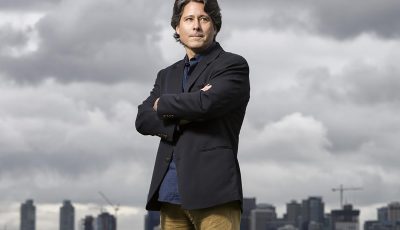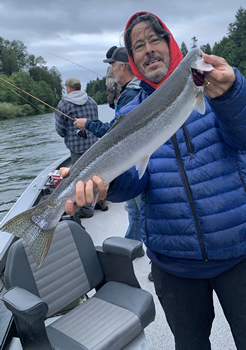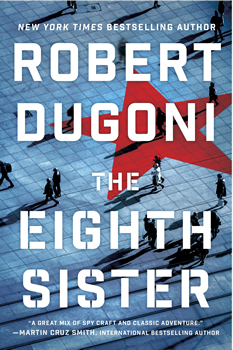

Up Close: Robert Dugoni
Returning to a Larger-Than-Life Hero
 By Josie Brown
By Josie Brown
One good turn deserves another.
For retired CIA operative Charles Jenkins— the protagonist in bestselling author Robert Dugoni’s newest series—this means returning to the country he barely escaped: Russia.
Once there, he must exfiltrate the covert asset who almost gave her life for his.
This momentous event takes place in the series’s first installment, The Eighth Sister.
It was initially written as a standalone. But with a larger-than-life hero and a timely plot, Dugoni’s publisher, Thomas & Mercer, saw immediately that it had a hit on its hands.
Dugoni was asked if he’d consider further storylines for Charles Jenkins. The author suggested pulling out just one line in the last chapter of the first novel. Doing so gave Jenkins a sound rationale to go back into the Cold.
A fast, satisfying plot was born, along with the impetus for a series that will engage readers for a long time.
The plot for Book Two—THE LAST AGENT—is predicated on Jenkins’s ability to exfiltrate the foreign asset who helped him escape in the first novel.
The way Jenkins sees it, he has no choice. “Paulina Ponomayova saved his life,” Dugoni says. “Doing so allowed him to go home to his child and pregnant wife. He owes it to her.”

Dugoni shows off a catch from a June outing on Washington state’s Cowlitz River with guide Bob Kratzer.
Since he’s a wanted man in Russia, surreptitiously returning is Jenkins’s first ordeal. He has two things that automatically make him stand out: his hulking size and the fact that he’s Black.
Like many authors, Dugoni has several continuing series. A trait he carries through all of them: his protagonists always have a strong sense of family.
“It’s always been important to me,” Dugoni says. “I was raised in a terrific family. And now I have a great family in my adult life. When you are married and have a good relationship and have kids, you don’t make decisions in a vacuum. You’re always making decisions that are best for your family. At the same time, we are all individuals. We live individual lives. The trick is balancing both. Someone like Jenkins is exceptionally skilled in spycraft. He has a high moral and ethical standard. He can’t walk away from someone who put her life on the line so that he could escape and continue his life with his young family. He can’t just let her die.”
That’s where the primary conflict comes into the story. In Book One, the fact that Jenkins was arrested for treason has left his family wary of any further interaction with his previous employer, the CIA.
Dugoni now thinks it’s possible that one of his childhood friends’ fathers might have been a CIA operative. “His parents were an older couple. The mom was wonderful—the stay-at-home type who made cookies.”
Oddly, a packed suitcase was always in the corner.
Dugoni would ask, “Is he going somewhere?” His friend’s mother would answer: “We never know when he’ll have to go on a trip.” Dugoni was bold enough to ask, “What does he do?” Her answer: “He works for the government.”
“She really didn’t know exactly what he did,” Dugoni says.
In talking to his sources, Dugoni learned that relationships going sour are a fact of life for too many CIA operatives. During a past ThrillerFest, when he had an opportunity to tour the agency, the rationale for his neighbor’s cluelessness was explained this way: “You can’t tell them what you really do for a living. Such knowledge puts tremendous pressure on you and your spouse. Many CIA officers end up marrying each other for that very reason.”
Jenkins is not one of those protagonists who is a single loner with no relationship and no kids. Unlike Bond, he has a lot to lose. For that reason, Dugoni wrote Jenkins’s wife, Alex, as a former CIA operative. “She understands the situation better than most spouses.”
In The Eighth Sister, Alex warily gives her tacit approval for Jenkins to accept the mission. “Otherwise, throughout the series, the issue of his ongoing involvement with the CIA would always stand between them,” Dugoni says.
“Many of the characters who appeared in The Eighth Sister also show up in Book Two, but their roles have significant twists,” Dugoni adds. “And in Book Three of the series, the twists will be totally different.”
For example, Jenkins’s Russian nemesis—Viktor Federov, the FSB operative who chased Jenkins in the first book—returns in THE LAST AGENT.

Dugoni enjoys a beer in Bend, Oregon, with his wife Cristina, his son Joe, and his daughter Catherine.
Dugoni didn’t write him as the archetypical bad guy. “I tried to make him very human—the Russian Charles Jenkins. He’s a father, but estranged from his wife and daughters because of his job’s covert mandate. Still, they mean much to him.”
In fact, Federov admires Jenkins because he was just doing his job.
And Jenkins respects him too. “My sources admit that there were operatives on the other side that they respected for that very reason,” Dugoni says.
In THE LAST AGENT, Federov is a reticent ally—and his participation comes at a significant price.
Unlike Federov, Jenkins will never put profit before country. “Charles’s motivation will always be deeper than money,” Dugoni says. “The mission will have to be something that resonates with his moral and ethical beliefs.”
Despite bringing back the characters who made the first book so powerful, the pacing and plot for THE LAST AGENT are entirely different from the series’s first book. Case in point: “The Eighth Sister ends in a trial based on a true story,” Dugoni points out. “Whereas THE LAST AGENT is a chase from start to finish.”
The antithesis of Federov is Jenkins’s new nemesis: Adam Efimov. When the FSB learns that Jenkins is back in town, Efimov is charged with finding him and learning why. He is a man so sadistic that even Putin can’t stomach him. Still, catching Jenkins will put him back in the Russian president’s good graces.
As characters often do, Efimov fleshed himself out slowly to the author. Says Dugoni: “A lot of him came through research. He just crystalized. I recognized immediately that he was going to be an evil guy.”
The son of a bricklayer, Efimov’s great physical strength comes from having been forced to work as one too—and getting beaten with bricks for his mistakes. He even keeps a brick on his desk to intimidate his underlings.
The novel starts out with a tense chapter: Paulina, now a prisoner in Russia’s infamous Lefratova Prison, is being brutally tortured.
Dugoni had hoped to find an American who’d been imprisoned there. No such luck. “There’s almost no source material out there on it. What was said was once you went in, you disappeared,” he says.
However, Dugoni’s research on the next Charles Jenkins novel led him to a book about another maximum-security prison: the now-extinct Lubyanka, which was located in the bowels of FSB’s Moscow headquarters. The wince-inducing details of this torture chamber helped him envision what Paulina would have gone through. “Boom, there she was,” he says, with enthusiasm.
As for the pinnacle scene—the exfiltration—it took Dugoni several days and sleepless nights to come up with it. “None of my original ideas worked. Then, as it often happens when we’re puzzling and puzzling, I wake up in the middle of the night with how it could happen. Sometimes, it’s a more straightforward solution than you think.”
His vision was vindicated by research for subsequent Charles Jenkins books. “This happens a lot. For example, in one of the prison scenes, a magic trick is used. I thought to myself, ‘Is this going to be too far-fetched?’ Actually, as part of CIA operative training, magicians were brought into the Farm to teach sleight-of-hand techniques for brush passes and disappearing tricks.”
It doesn’t surprise Dugoni that sometimes reality is stranger than fiction. “You know, we authors think we’re really slick, but we’re not.”
The last third of the novel deals with Jenkins’s escape from Russia. For him to succeed in this odyssey, Dugoni showed real ingenuity in the myriad modes of transportation used, including Russia’s vast modern train system.
The key to the escape: becoming invisible. “In US spycraft, the goal is not to even let them know you’re there, let alone that you did anything,” Dugoni says. “It’s not the James Bond ‘run and shoot.’ Otherwise, that’s when your problems begin. In fact, most CIA operatives don’t even carry guns. The job is to accomplish the mission without the other side knowing.”
It’s an almost impossible feat, considering that Americans—with and without diplomatic ties—are always under surveillance.
To slip past a tail, the operative will set up a decoy. “For example, when two people walk out of the US embassy and get into a car, they’ll be followed by three teams of KGB agents,” Dugoni explains. “The operative puts his briefcase between him and the driver. The driver then makes a right turn, then another right turn. This allows them to put distance between themselves and the cars that follow them. In that thirty seconds, the guy in the passenger seat rolls out of the car as it’s still moving, perhaps into bushes. The driver then presses a button on the briefcase and a cutout pops up. By manipulating certain buttons, he can even get the cutout to move. The guy who got out of the car then has time to put on a disguise—a mask, hat, glasses, a beard. Maybe something that makes him look like an old Russian woman with a shopping cart. The game is misdirection, so that you have time to accomplish an escape.”
Although the coronavirus pandemic has put Hollywood in a standstill, the Charles Jenkins series has also been optioned for television.
Dugoni has tremendous respect for the producer-showrunner’s vision for it—including how the first novel’s plot could be reconfigured so that its unique twists and turns keep its television viewers on the edge of their seats.
For example, instead of the first book’s climactic trial, the producer sees it as the framework for telling the story. “It could open the show,” Dugoni says. “Here’s a Black male—a CIA operative—being charged with espionage. The audience is thinking, ‘They won’t cut him any breaks!’ But then, through flashbacks, they see that he got the short shaft—twice.”
Dugoni loves that others realize his series’s cinematic potential. “I thought her vision was brilliant. I said, ‘Where were you when I was writing the novel?’ She laughed.”
Dugoni was once asked if he’d like to write a screenplay of one of his works. He passed. “Sure, there are authors out there who have that ability. But I would much rather have an A-list screenwriter tackle it. Producers are going to pay a lot more attention to someone who has real credentials.”
As with most authors with multiple series, it’s hard to play favorites. Every one of his book children means something to Dugoni. “I have a real fondness for Sam Hill. He is a character I love. Tracy Crosswhite is a character that changed my life and the lives of my family. So there’s a strong feeling I have for her because of that.”
In fact, another television deal is in the works for Sam Hill. And there is interest in the Tracy Crosswhite series as well. “These things snowball. But I’ll pass these things along (to my agent). Then if something comes of it, well, terrific. If nothing comes of it, it doesn’t change what I do for a living, or what I really enjoy doing: writing novels.”
And yet, of all Dugoni’s series, Charles Jenkins holds a place near and dear to his heart.
“He was my law school roommate. He was larger than life. Years ago, I told him, ‘Charles, someday I’m going to write you into a book.’ He is exactly like the guy in the book. The series has meaning to me because of him. And besides, he’s a lot of fun to write.”
*****
To hear the audio version of this interview, go to Josie Brown’s Author Provocateur Podcast.
Josie’s latest novel in The Housewife Assassin series is White House Keeping Seal of Approval. Look for the series’ twentieth book: Assassination Vacation Planner.
- Up Close: Jane Smiley - November 30, 2022
- Up Close: Lisa Barr - February 28, 2022
- Up Close: Kaira Rouda - December 31, 2021


